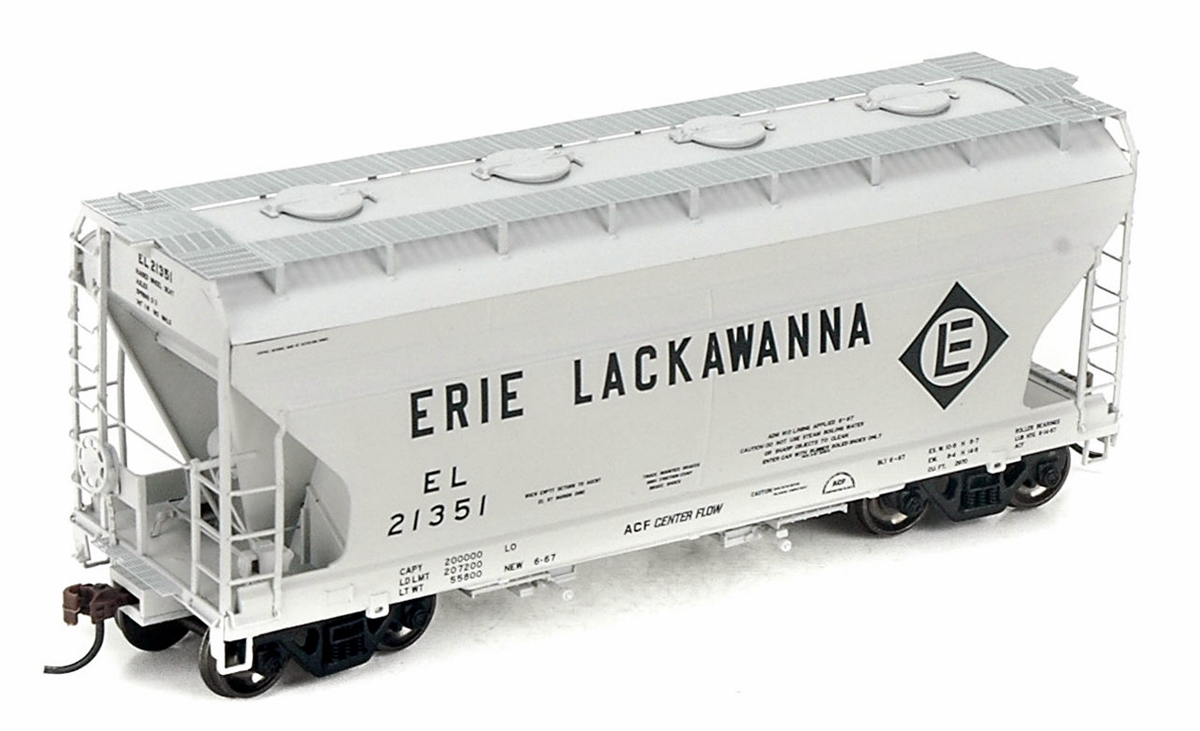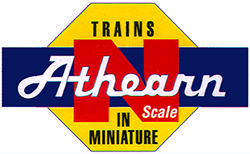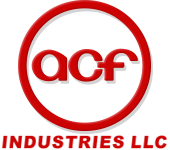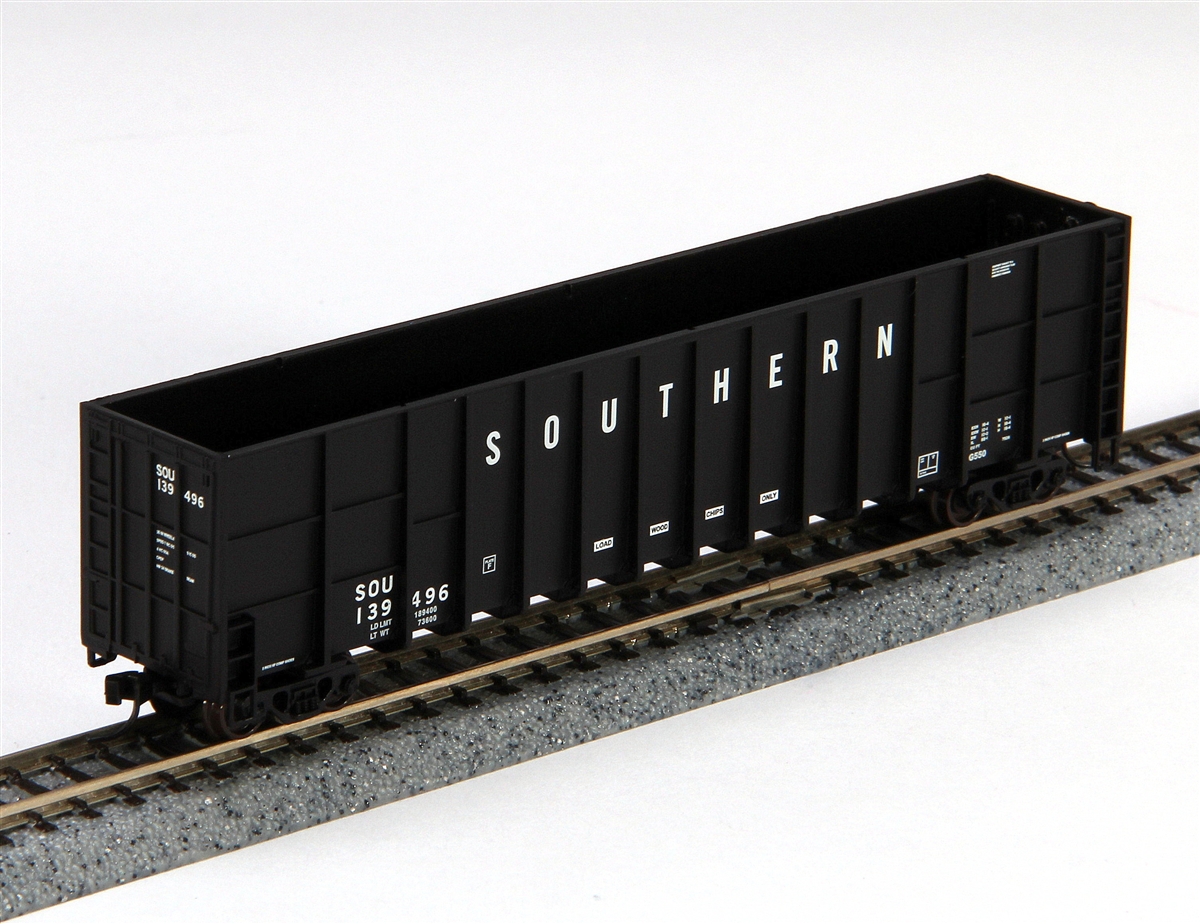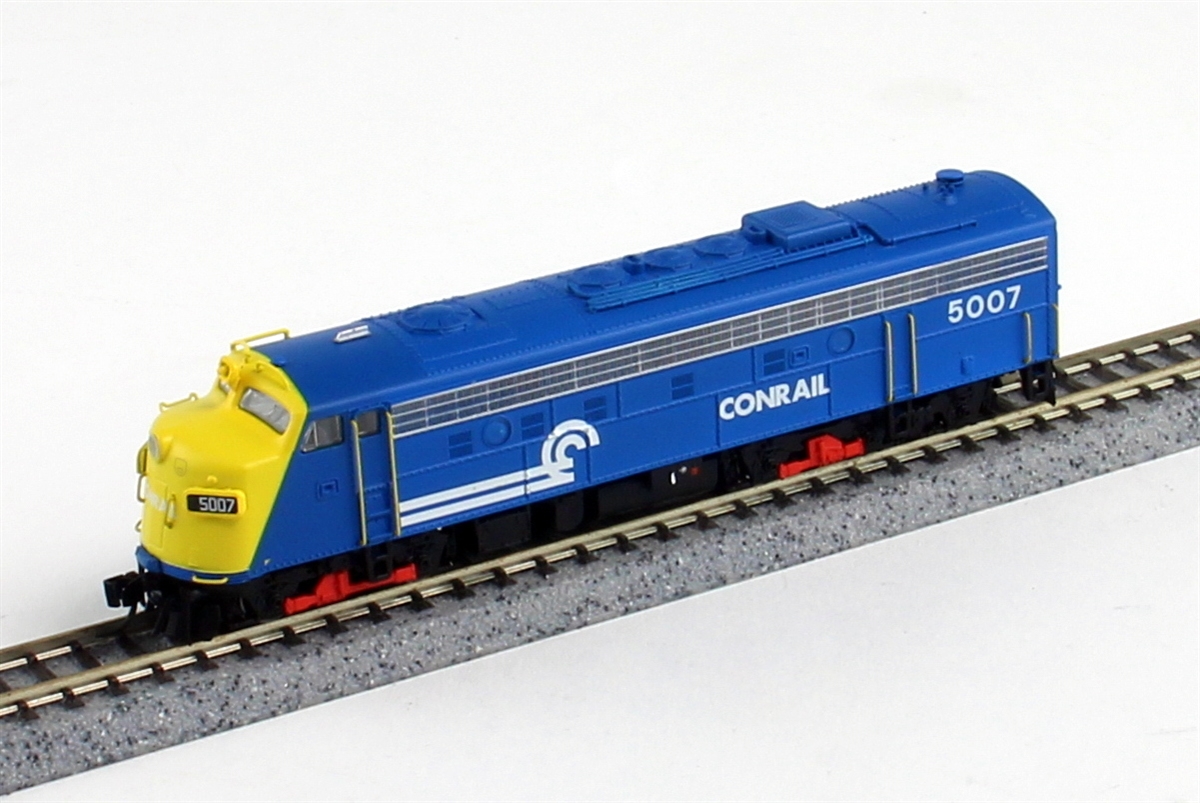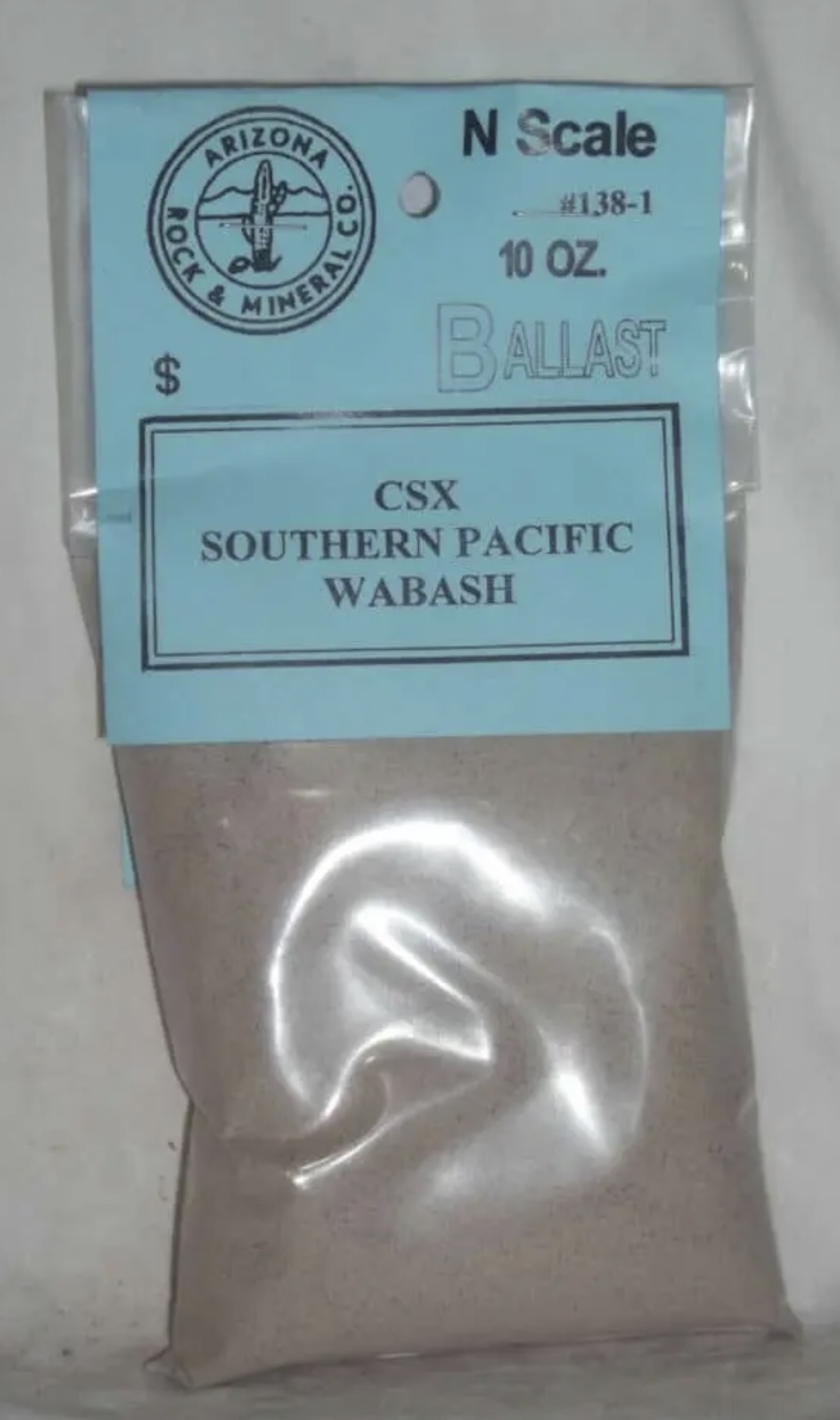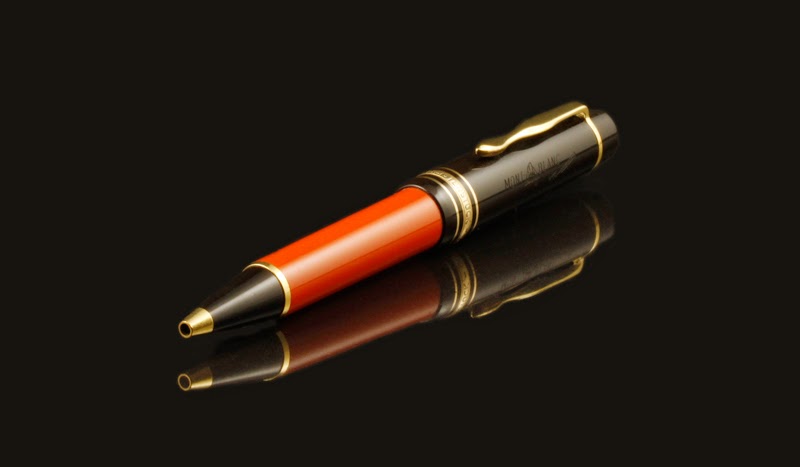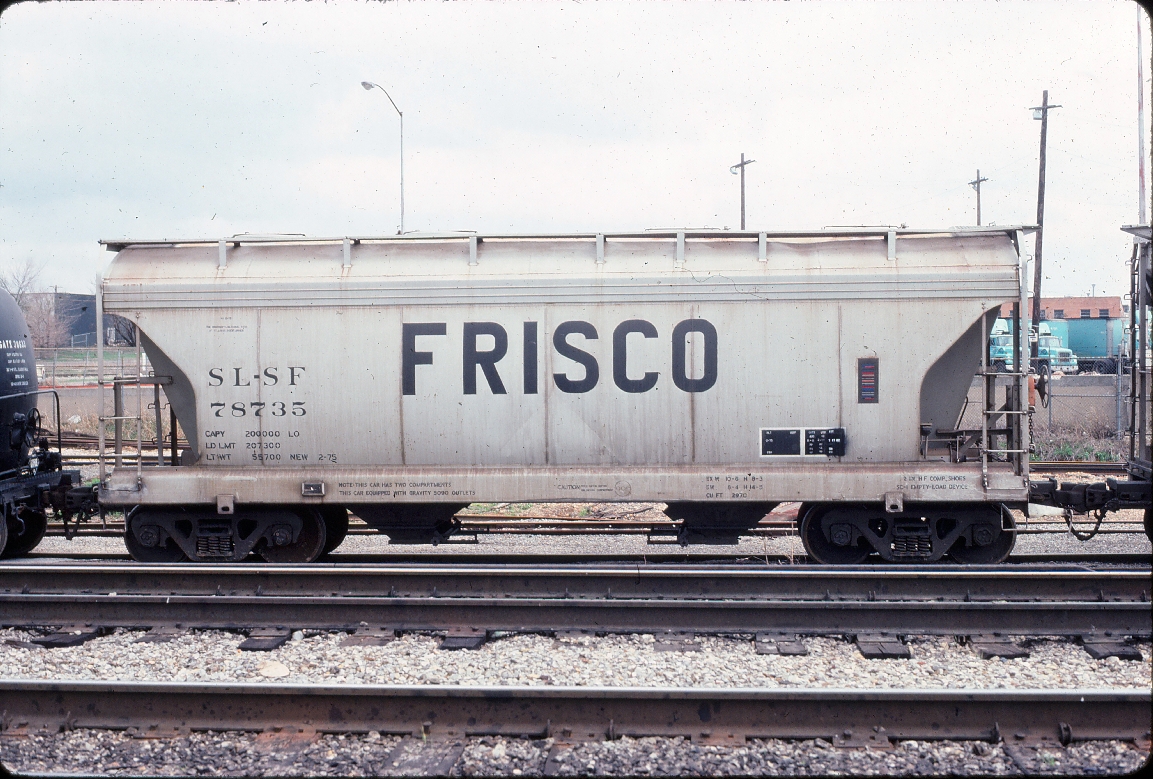Model Information: Features: Round or trough hatches per prototype;
Photo-etched metal roof walk;
Separately applied wire grab irons;
Separate brake cylinder, valve and air reservoir with brake plumbing;
Detailed outlets;
Minimum radius: 9-3/4"
Prototype History: The 2-bay covered hopper first entered service in the 1950s. The cars handle loads such as cement, sand and similar denser bulk commodities. In the 1960s, American Car and Foundry introduced the Centerflow design. The Centerflow relies on the car's rounded body to provide structural strength without the added weight of bracing, as well as making gravity unloading easier. This 2-bay car came in a 2,970-cubic foot capacity.
The first ACF covered hoppers were rib-side cars, like many others of the time. In the 1960's ACF eliminated the supporting ribs and started building what they called the Center Flow(R) hopper with a smooth, rounded side. The cars were built at several ACF plants, but the Huntington, West Virginia plant built only Center Flow cars since their inception and was the primary builder.
The first ACF covered hoppers were rib-side cars, like many others of the time. In the 1960's ACF eliminated the supporting ribs and started building what they called the Center Flow(R) hopper with a smooth, rounded side. The cars were built at several ACF plants, but the Huntington, West Virginia plant built only Center Flow cars since their inception and was the primary builder.
Road Name History:  The Erie Lackawanna Railway (reporting mark EL), known as the Erie Lackawanna Railroad until 1968, was formed from the 1960 merger of the Erie Railroad and the Delaware, Lackawanna & Western Railroad. The official motto of the line was "The Friendly Service Route".
The Erie Lackawanna Railway (reporting mark EL), known as the Erie Lackawanna Railroad until 1968, was formed from the 1960 merger of the Erie Railroad and the Delaware, Lackawanna & Western Railroad. The official motto of the line was "The Friendly Service Route".
Like many railroads in the northeast already financially vulnerable from the expanding U.S. Interstate Highway System, the line was severely weakened fiscally by the extent, duration and record flood levels due to Hurricane Agnes in 1972. It would never recover, and most of the corporation's holdings were subsumed into the federal rescue purchases creating Conrail in 1976, ending its days as an operating railroad company.
Read more on Wikipedia.

Like many railroads in the northeast already financially vulnerable from the expanding U.S. Interstate Highway System, the line was severely weakened fiscally by the extent, duration and record flood levels due to Hurricane Agnes in 1972. It would never recover, and most of the corporation's holdings were subsumed into the federal rescue purchases creating Conrail in 1976, ending its days as an operating railroad company.
Read more on Wikipedia.
Brand/Importer Information: Athearn's history began in 1938, when its founder-to-be, Irvin Athearn, started an elaborate O scale layout in his mother's house. After placing an ad selling the layout, and receiving much response to it, Irv decided that selling model railroads would be a good living. He sold train products out of his mother's house through most of the 1940s. After becoming a full-time retailer in 1946, Irv opened a separate facility in Hawthorne, California in 1948, and that same year he branched into HO scale models for the first time.
Athearn acquired the Globe Models product line and improved upon it, introducing a comprehensive array of locomotive, passenger and freight car models. Improvements included all-wheel drive and electrical contact. One innovation was the "Hi-Fi" drive mechanism, employing small rubber bands to transfer motion from the motor spindle to the axles. Another was the double-ended ring magnet motor, which permitted easy connection to all-wheel-drive assemblies. Athearn was also able to incorporate flywheels into double-ended drives.
The company produced a model of the Boston & Maine P4 class Pacific steam locomotive which incorporated a cast zinc alloy base and thermoplastic resin superstructure. It had a worm drive and all power pickup was through the bipolar trucks that carried the tender. This item was discontinued after the Wilson motor was no longer available, and was not redesigned for a more technologically advanced motor.
Athearn's car fleet included shorter-than-scale interpretations of passenger cars of Southern Pacific and Atchison, Topeka & Santa Fe Railroad prototypes. The company also offered a variety of scale-length freight cars with sprung and equalized trucks. The cars could be obtained in simple kit form, or ready-to-run in windowed display boxes. The comprehensive scope of the product line contributed to the popularity of HO as a model railroad scale, due to the ready availability of items and their low cost.
Irv Athearn died in 1991. New owners took control in 1994, but continued to follow Athearn's commitment to high-quality products at reasonable prices. Athearn was bought in 2004 by Horizon Hobby. Athearn was then moved from its facility in Compton to a new facility in Carson, California. In mid-2009, all remaining US production was moved to China and warehousing moved to parent Horizon Hobby. Sales and product development was relocated to a smaller facility in Long Beach, California.
Read more on Wikipedia and Athearn website.
Athearn acquired the Globe Models product line and improved upon it, introducing a comprehensive array of locomotive, passenger and freight car models. Improvements included all-wheel drive and electrical contact. One innovation was the "Hi-Fi" drive mechanism, employing small rubber bands to transfer motion from the motor spindle to the axles. Another was the double-ended ring magnet motor, which permitted easy connection to all-wheel-drive assemblies. Athearn was also able to incorporate flywheels into double-ended drives.
The company produced a model of the Boston & Maine P4 class Pacific steam locomotive which incorporated a cast zinc alloy base and thermoplastic resin superstructure. It had a worm drive and all power pickup was through the bipolar trucks that carried the tender. This item was discontinued after the Wilson motor was no longer available, and was not redesigned for a more technologically advanced motor.
Athearn's car fleet included shorter-than-scale interpretations of passenger cars of Southern Pacific and Atchison, Topeka & Santa Fe Railroad prototypes. The company also offered a variety of scale-length freight cars with sprung and equalized trucks. The cars could be obtained in simple kit form, or ready-to-run in windowed display boxes. The comprehensive scope of the product line contributed to the popularity of HO as a model railroad scale, due to the ready availability of items and their low cost.
Irv Athearn died in 1991. New owners took control in 1994, but continued to follow Athearn's commitment to high-quality products at reasonable prices. Athearn was bought in 2004 by Horizon Hobby. Athearn was then moved from its facility in Compton to a new facility in Carson, California. In mid-2009, all remaining US production was moved to China and warehousing moved to parent Horizon Hobby. Sales and product development was relocated to a smaller facility in Long Beach, California.
Read more on Wikipedia and Athearn website.
Item created by: gdm on 2016-09-20 08:20:19
If you see errors or missing data in this entry, please feel free to log in and edit it. Anyone with a Gmail account can log in instantly.
If you see errors or missing data in this entry, please feel free to log in and edit it. Anyone with a Gmail account can log in instantly.


